How Children Play
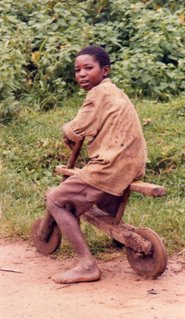 I believe we need to take risks, all of us, otherwise things remain the same. Some of the risks are personal. Even if you mean well you can do harm. In fact, meaning well has been a terrible thing in some cases and some places. Take the incarceration of aboriginal children in missionary schools for instance. Who knew it would result in such abuse? Who even suspected? So one must always tread lightly when one thinks one is doing good for someone else.
I believe we need to take risks, all of us, otherwise things remain the same. Some of the risks are personal. Even if you mean well you can do harm. In fact, meaning well has been a terrible thing in some cases and some places. Take the incarceration of aboriginal children in missionary schools for instance. Who knew it would result in such abuse? Who even suspected? So one must always tread lightly when one thinks one is doing good for someone else.Thinking that what you do is more important than it actually is also constitutes a real risk when you work in the developing world.
A friend of mine, who was an acknowledged friend and supporter of aboriginal people and their aspirations, was told by an articulate and
 observant aboriginal friend, that he was the real problem.
observant aboriginal friend, that he was the real problem. “Pompous bureaucrats influence no one,” his friend George said.
“Because you are sympathetic and caring, you are the one having an impact. You are changing things in the communities where you work in unknown and unwanted ways.”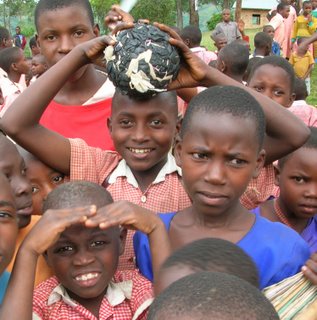
We need to be glad of such friends and also wary when we feel most sympathetic and justified in our stance. A group of us before coming to Africa were addressed by Ivan Illich. I can hardly credit now that he was there in person. His words certainly were, so maybe they were delivered by someone else. They were, very definitely, his words. If you have read his "Medical Nemisis" or "Deschooling Society" you will recognize his message.
Ivan Illich said, "Don't come to change us or help us. Come because you are getting something out of it. Take pictures of our wild flowers, study the animals, climb the mountains if you like, but leave us alone. We want to make our own mistakes."
 Half of us had a crisis of committment right then and there. I nearly turned around and headed home. He wasn't angry but he was forceful. I held his words close to my heart and read his books. His ideas proved very useful to me in medicine. He takes an extreme position, but he has a point. So, early on, I admitted to myself that I was in the developing world to learn what I needed to know.
Half of us had a crisis of committment right then and there. I nearly turned around and headed home. He wasn't angry but he was forceful. I held his words close to my heart and read his books. His ideas proved very useful to me in medicine. He takes an extreme position, but he has a point. So, early on, I admitted to myself that I was in the developing world to learn what I needed to know.
Or as Gloria Steinem says, "We write what we need to read."
I like to take pictures and collect baskets. It has been my fall back position. As I go on, I continue to add things that I am getting out of being here. The list has become very long . Some of my best learning, most poignant insights and finest hours are in these so-called tangential pursuits. Here is really where I connect with the people and place and see my own input in perspective.
. Some of my best learning, most poignant insights and finest hours are in these so-called tangential pursuits. Here is really where I connect with the people and place and see my own input in perspective.
Most of the pictures here were taken in the sheer exhilaration of seeing children at play, appreciating it and celebrating it. Some are from the southwestern part of Uganda where I am now. The vehicles made from sorghum stems come from Lira and Gulu, in northern Uganda. I have also seen elaborate churches made of sorghum stems in Ethiopia so they are probably to be found wherever there is lots of sorghum.
I am currently joined in the Guest House at the university by two Swedish plastic surgeons and their wives for a week. One of the surgeons has been coming for five years.
We share details of our days. They arrived from 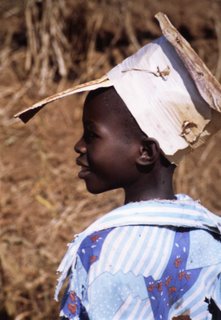
I have been supervising repairs on the house, meeting with one of our facilitators about how to record data during the upcoming Mass Measles Immunization, pulling together our Training of Trainers report and discussing with my boss how to set up a transparent process for selection of a Micro Project Manager because he is being inundated with candidates wanting special consideration.
None of this I share with the Swedes. Instead, I tell them about the three under-five deaths in a single village, one a child of a volunteer, that occurred this week. As if to show that the work I am engaged in is also useful. Then I am overwhelmed with sadness that our project isn't doing enough, or moving fast enough so we continue to have such deaths. We are having trouble even getting an accurate count of what goes on in the villages. I would be deluded to think I was here changing things. Days like this I don't even feel like a physician.
 So for a brief moment today, I wish I was a plastic surgeon and could fix things like cleft palates and leave. I know it doesn't make sense but I start to recall the time I spent on plastics with nostalgia.
So for a brief moment today, I wish I was a plastic surgeon and could fix things like cleft palates and leave. I know it doesn't make sense but I start to recall the time I spent on plastics with nostalgia.
Thankfully it doesn't last long. Today is a day I need to remember Ivan Illich's words. None of us, who "come from away" as Newfoundlanders say, are here to change things. I can just plod along, do the best I can and remember that I enjoy taking pictures of kids at play.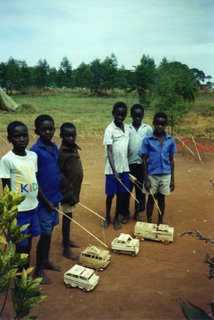
Being in and of the community I get lots of exposure to the varied and multitudinous ways in which children play. Kids are creative, maybe especially in
Here in their creative play, we have children in their glory. Wonderful hats, dolls and skipping ropes made from banana fibre, tire rims rolling along under the control of a stick, clay birds shaped from anthills by hand, land rovers, buses, tanks and ambulances all made from sorghum stems pierced and held together by splinters of bamboo thin as toothpicks.
The wives of the surgeons want to know where to find the Ankole millet baskets with covers, the finely woven lids of wooden milk containers and children's toys. The search for what is unique and fine, interesting and exciting in a culture always leads us back to community. I can link them up with our women's groups who are looking for markets. This might be helpful.
Photos: child on wooden bike; rolling a tire rim; soccer player with ball made of plastic bags and banana fibre; bird made from anthill clay; skipping with a twisted banana fibre rope; hat made of banana fibres;3 lads in banana fibre hats; four sorghum stem vehicles.
Labels: Uganda
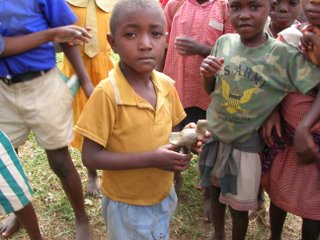


6 Comments:
More extraordinary photographs and observations. It is fascinating to read these posts.
Regards - Shinga
I read your post several times. There is much discussion in what you have said. The children are beautiful. That is the easiest comment. We observe and judge other cultures from our own cultural perspective, and that is where things can go off track so easily, even when we have the best intentions. Your task is overwhelming. I admire your compassion and thoughtfulness and know that you are a positive force in what you are doing.
This would be me. I'd be so busy playing with the kids that I would never get any work done! I see the world as one big crafts fair and I want all of it! : D
Aren't the kids the best part of any culture, always?
"...to make our own mistakes." Isn't that what all of us have to do as we learn and grow?
Great post - again, I was transported into your world. Thank you!
Thanks Shinga, you are going to love Africa.
Ruth - Your comments are so thoughtful they get me thinking about other things going on. IMy problems start when I begin to see it as "my" task. Then I need to focus on photos and baskets. Thanks for your kind thoughts.
Kim- All too true. Good to have you drop by.
Great post Travelling Doc.
A lovely post. You write with a heart. Indeed, the only thing one can do in a situation like that is to enjoy what nature can offer. Just as the children have come to accept and make do of what's available.
I know people will be grateful for your presence and your help. You've done great job!
Post a Comment
<< Home